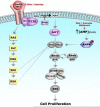Understanding obesity and endometrial cancer risk: opportunities for prevention
- PMID: 21802066
- PMCID: PMC4264838
- DOI: 10.1016/j.ajog.2011.05.042
Understanding obesity and endometrial cancer risk: opportunities for prevention
Abstract
Worldwide, obesity has become a major public health crisis. Overweight and obesity not only increase the risk of cardiovascular disease and type-2 diabetes mellitus but also are now known risk factors for a variety of cancer types. Among all cancers, increasing body mass index is associated most strongly with endometrial cancer incidence and death. The molecular mechanisms underlying how adipose tissue and obesity contribute to the pathogenesis of endometrial cancer are becoming better understood and have revealed a number of rational strategies, both behavioral and pharmaceutical, for the prevention of both primary and recurrent disease.
Copyright © 2011. Published by Mosby, Inc.
Figures



References
-
- Renehan AG, Tyson M, Egger M, Heller RF, Zwahlen M. Body-mass index and incidence of cancer: a systematic review and meta-analysis of prospective observational studies. Lancet. 2008;371:569–78. - PubMed
-
- Calle EE, Rodriguez C, Walker-Thurmond K, Thun MJ. Overweight, obesity, and mortality from cancer in a prospectively studied cohort of U.S. adults. N Engl J Med. 2003;348:1625–38. - PubMed
-
- Von Gruenigen VE, Tian C, Frasure H, Waggoner S, Keys H, Barakat RR. Treatment effects, disease recurrence, and survival in obese women with early endometrial carcinoma : a Gynecologic Oncology Group study. Cancer. 2006;107:2786–91. - PubMed
Publication types
MeSH terms
Grants and funding
LinkOut - more resources
Full Text Sources
Medical

